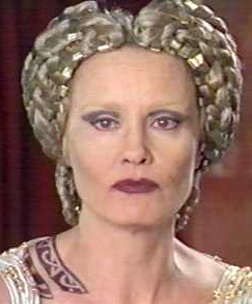While reading Titus Andronicus, I couldn't help but think of the television show Revenge. Both the play and the television series are essentially centered around a woman's thirst for vengeance, despite being presented as the typical tale of the epic hero's fall.
In Titus Andronicus, the play really gets going after Tamora's son is killed. Pretty much everything that happens - Lavinia's rape, Bassianus's murder, etc. - is a result of Tamora's desire for revenge. Similarly in Revenge, Emily Thorne (the character around whom the show is centered) is somewhat of a Tamora figure who is determined to avenge the supposed framing and murder of her father. It is very interesting to see how both Emily and Tamora are either presented or perceived (by people in their respective fictional realms, and outside those realms) as psychotic, villainous characters.
However, what I appreciate about Revenge is that instead of forcing Emily to fit into a Madonna/whore binary, the show allows her character to have depth and complexity - just like a real woman does. Emily can be conniving and ruthless, but no matter what kind of twisted things she does, she still has her humanity. Instead of painting Emily as a woman who is evil to the core, the show places the emphasis on her actions - and not all of her actions are bad. Emily is frequently depicted showing remorse for those that she injuries on her quest for revenge, including people who have betrayed her.
On the other hand, Shakespeare, in Titus Andronicus, doesn't afford Tamora much humanity. By contrasting Tamora with the angelic Lavinia, Shakespeare presents Tamora as the "whore". Not once does she seem like an actual human being - she's just a fair-skinned devil.
Perhaps if Tamora's character was given more humanity (such as in Julie Taymor's film interpretation of the play), I would've enjoyed the play more.
This all led me to think about the reason that we still have so many strict gender binaries even though we are centuries past Shakespeare's time. If women are constantly being presented in literature and pop culture as either vindictive wenches or virginal paragons of virtue, then that's what people will expect women to be. Revenge (even with their many flaws) are a step in the right direction.
It is a bit sad that we aren't at a place where we can see ridiculous representations of women and critique them or understand the irony behind those representations, but shows like
Until our society is at a point where it is the norm for female characters to be portrayed with the same complexity as male characters, I'll take solace in the fact that it's the genius female characters like Emily and Tamora who are responsible for some epic revenge.



This has got to be my favorite post! I loved how you made Shakespeare relevant to women today by comparing it to a modern television show that many people watch. I personally have never seen the show Revenge, but have heard great things about it. By comparing and contrasting Emily and Tamora you really emphasized their sources of strength and sources of weakened. I liked that Emily was perceived as vengeful and horrible but also humane and compassionate. Although Tamora is perceived as vicious, she clearly has a reason to be after her son is mercilessly murdered. I also liked how you applied these ideas to gender binaries today. Women are either angelic or whorey when it comes to defining and passing judgement on them. What's sad is that these definitions still exist and probably still exist for a little while longer. But bringing these issues to the forefront make them more pressing issues that need to be addressed and Emily's and Tamora's situations make that evident.
ReplyDelete